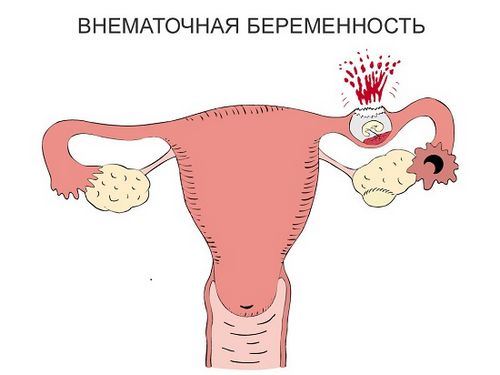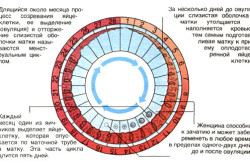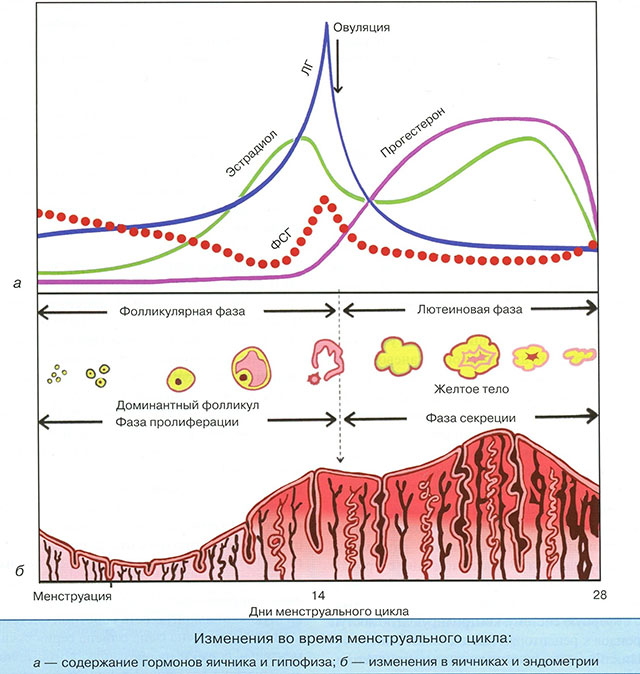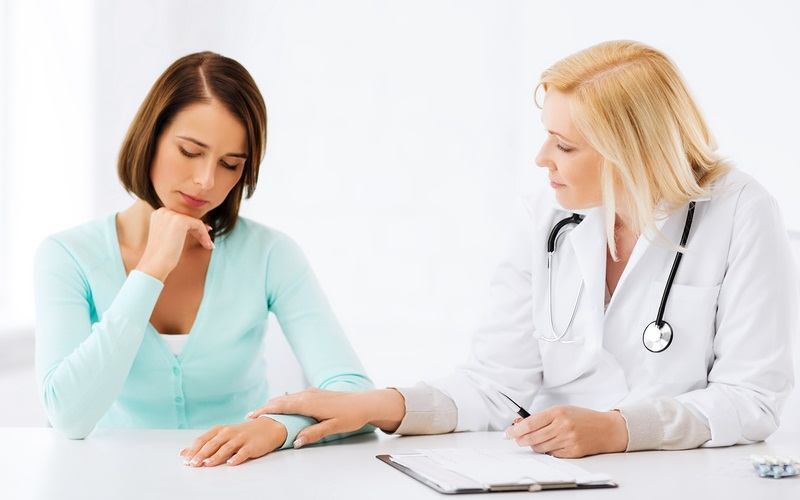For the vast majority of women, delay and pain in the lower abdomen are a good reason to go to the pharmacy for a pregnancy test. When the cherished two red lines appear on the test strip, the expectant mother can be congratulated on the onset of pregnancy. However, what if the test is negative? The answer to this question is extremely simple: immediately go to the doctor.
Delay and pain in the lower abdomen with ovarian dysfunction
Delay and pain in the lower abdomen, traditionally considered the first signs of pregnancy, can also be symptoms of many ailments, the most common of which is ovarian dysfunction. It may appear as a result of any gynecological disease (for example, adnexitis, polycystic ovaries,) or an endocrine disorder (thyroid disease).
Ovarian dysfunction develops with a disorder of the hormone-forming function of the ovaries, as a result of which the menstrual cycle and there is no ovulation. The disease is manifested by a delay in menstruation for more than 4-5 months, after which the bleeding that has begun lasts more than 7 days. But frequent erratic menstruation is also possible.
With ovarian dysfunction, there are pulling, dull or cramping pains in the lower abdomen, as well as in the lower back.
The disease can cause or inability to bear a fetus, uterine fibroids, endometriosis, and can also indicate existing malignant tumors and ectopic pregnancy.
Delay and pain in the lower abdomen with varicose veins of the small pelvis
Pulling pains in the lower abdomen and in the perineal region are characterized by varicose veins of the small pelvis or varicocele in women. Also, with this disease, a delay in menstruation and discomfort after intercourse are possible.
Varicocele has a progressive course. The disease begins to develop in adolescence and is asymptomatic, therefore, it is possible to diagnose changes in the venous system of the small pelvis only when using additional research methods. Pain syndrome increases with age, pains differ in variety. There are no specific symptoms of varicose veins of the small pelvis, so women with pain in the lower abdomen and delayed menstruation need to examine the venous system of the small pelvis.

The disease is chronic and a complete cure is impossible. Treatment is complex, including exercise therapy and drug therapy.
Delay and pain in the lower abdomen during ectopic pregnancy
Similar symptoms may well be provoked by an ectopic pregnancy, which at first proceeds in the same way as a normal one. With an ectopic pregnancy, nausea, dizziness, loss of consciousness and weakness are often observed. Constant mild dull or aching pain during such a pregnancy can be on the right or left side of the abdomen just above the pubis.
If you do not see a doctor in time with similar symptoms, there is a high risk of rupture of the fallopian tube and opening of internal bleeding.
Delay and pain in the lower abdomen with adhesions
In the chronic form of adhesive disease, periodically appearing aching pains in the lower abdomen are noted, there may also be delays in menstruation and. Thus, endometriosis or latent infections can manifest themselves. Adhesions are dangerous because they can lead to infertility. The disease is diagnosed when examined by a gynecologist, taking into account the woman's complaints and anamnesis. An accurate diagnosis is made only after an additional examination.
With untimely treatment, the development of infertility, bending of the uterus, menstrual irregularities, ectopic pregnancy are possible.
Delay and pain in the lower abdomen with polycystic ovaries
The ovaries can cause delayed menstruation and pain in the lower abdomen. With this disease, small cysts form and grow in the ovaries. It is caused by hormonal disorders in the female body. The disease can occur without symptoms, but sometimes there is a delay in menstruation and pulling pains in the lower abdomen. The pain may radiate to the pelvis and lower back. Obesity and increased greasiness of hair and skin can also join these symptoms.

Polycystic ovaries can lead to infertility and miscarriage.
Delay and pain in the lower abdomen due to negative external influences
In addition, the female body is extremely sensitive to any negative external influences, and the slightest hypothermia or overheating, sudden weight gain or loss, severe stress, overwork can cause menstrual cycle failure and pain in the abdomen. Inadequate nutrition and adherence to strict diets can also cause delay and pain in the lower abdomen.
In any case, if you feel pain in the lower abdomen, which, moreover, is accompanied by the absence of menstruation for more than 5-7 days, you should go to the gynecologist. The specialist will help determine the cause of such symptoms and, if necessary, prescribe the appropriate treatment for the problem that provoked their occurrence.
Often, women have such situations - that menstruation is late, and pulls the lower abdomen. Therefore, young ladies begin to worry, therefore, about, and especially nervous because of abdominal pain. Pain in the lower abdomen is an unpleasant sensation because the uterus is located in the abdominal cavity, which evokes fear that something may be wrong. Such pains for each woman are individual, some are more sensitive, and some can endure.
For one woman, her everyday life does not depend at all because of the delay, while another even has a loss of consciousness, severe headaches. Almost every woman complains that her stomach is pulling, this is a sign that menstruation is approaching and you should not be nervous. Such symptoms often occur in women who have not given birth, in addition to everything, another factor joins, the lower back aches, sometimes there are even severe pains in the head area, general weakness of the body, and legs swell.
But in almost all women during this period of time, their mood changes dramatically, and all because of the appearance of PMS. If a woman has a monthly cycle delay of about 4-7 days, then this is normal and should not be worried. Such changes inside the body can be triggered by many factors such as stress, physical overload, as well as if a woman has drastically changed her diet, lost weight or gained excess weight, it even got to the point that it was simply from climate change.
There are many such factors. Another delay occurs when a woman has an abortion or stops taking hormonal pills without being examined by the attending gynecologist. In such cases, pain in the lower abdomen is observed, this is the first sign of a symptom that PMS is approaching and gives a signal about the arrival of menstruation.
Delay, as well as sipping pain in the abdomen - a sign of pregnancy
A woman who has given birth to a child can easily confirm the fact that during pregnancy she had discomfort in the abdomen or was drawn to the bottom of the abdominal band. When the delay lasts more than seven days, then this is the first factor that fertilization has occurred, or rather, this is the moment the egg is attached to the uterine cavity. In order to make sure that a woman is pregnant, you need to take a pregnancy test at home.
But do not forget, and women need to be attentive to pain, because its mild form is considered as a sign of pregnancy, and as for pain, which tingles, this is a sign of an ectopic pregnancy, which promises a high risk of miscarriage, this is already a pathology. To find out how the pregnancy is proceeding, and whether there is any pathology, you can very simply examine yourself if a woman has inherent symptoms such as headache, severe breaking in the lower back, gray or brown highlighting.
Delay and pulls the lower abdomen, this is an indicator of unhealthy female organs
The bad news that pulls the lower abdomen is that a woman suffers from various gynecological inflammations or diseases, but at least pathology. It can be: apoplexy, or often women call this disease ovarian hemorrhage, polycystic ovaries - cyst, uterine fibroids, adhesive disease. Irregular periods, which occur in conjunction with severe pain in the abdominal cavity, can only speak of one thing, that the hormonal system in the woman's body is failing, or rather, its imbalance.

This factor can also be reflected in the contraction of the uterus. Therefore, doctors recommend that women be attentive to their body, pay attention to all sorts of changes. After all, a timely identified problem at an early stage has a high probability that it can be cured.
Loop failure
Sometimes every woman has a delay in menstruation in the period from 2-4 days, this does not mean absolutely nothing bad. The cycle has the ability to change, this is not an axiom, it is very rare for any woman to have an organism that works like a clock. For example, let's take 10 fully healthy women, and only 3 will be able to say with accuracy that their periods are evenly flowing, that is, there are no failures.
If a woman has a delay in menstruation that lasts 5 days, then this is considered normal, but only if there are no other symptoms, suspicious discharge or sharp pains. Women need to remember that with such failures, it almost always happens not strong pain lower abdomen, the mood worsens, which means wait for the guests for the first signs of premenstrual syndrome.
Gynecological diseases
Sometimes there are unforeseen circumstances when a harmless delay in menstruation, lasting about 4-5 days, is the first signal that a woman's body is undergoing dangerous disorders, these can be gynecological diseases. The first symptoms of this disorder have their own additional characteristics, of course, it is easy to recognize them, but it is possible even if the woman does not visit her doctor.
In the first days, there are severe pains in the abdomen or lower back for each woman, this is individual. Also, the pain in the abdominal band becomes very sharp, which is not possible to endure. A gynecological disease can provoke abnormal brown or bloody discharge, which has a very unpleasant odor. After a couple of days, severe itching appears in the area of the labia, unforeseen discomfort is felt when a woman has sexual intercourse or when urinating.

Almost all women are wondering what factors can provoke such a pathology. Doctors, conducting long studies, established two factors. Which are the causative agents of the inflammatory process, they can manifest themselves due to hypothermia of the body or infection. If such a pathology has already arisen, then the woman needs to prepare for the fact that the treatment will be very long, and there may be some complications.
Pain in the chest
When there is a delay in menstruation, they may be accompanied by other manifestations, such as sharp pain in the chest. Sometimes it happens that severe chest pain in women is mistaken for pregnancy, but for this you need to be checked by a gynecologist who will conduct a complete examination of the patient and, thanks to the tests obtained, will be able to establish the cause of this pathology.
Sometimes this indicates that chest pains signal that menstruation is approaching. Often this is provoked by the fact that a woman does not eat properly and the body does not receive the substances it needs. There are other reasons that for some reason menstruation has not come on time and the pain continues - a sign that mastopathy is developing.
This disease can be manifested by the formation of a seal or small nodes. Recommendation of doctors - dear women, please do not put off going to the mammologist or gynecologist. Experienced specialists will appoint their patient to undergo tests, as well as ultrasound of the mammary glands, so that a woman can avoid surgical intervention. Another cause of chest pain is when a woman wants to lose weight and goes on a strict diet or malnutrition that harms the body.
Delayed menstruation and pain in the lower abdomen - what could it be?
The first thought that occurs in a woman with a delay in menstruation is that pregnancy has come. This is the most common reason for the absence of menstruation. Whether there is a pregnancy or not can be determined using home tests. Pain in the lower abdomen can be felt in the early stages and is not a pathology.
But what if the test shows a negative result, and there is a delay in menstruation and even abdominal pain? The answer is unequivocal - go to the doctor and deal with this problem with the help of a specialist.
Most likely, the cause of this condition was ovarian dysfunction. It can occur against the background of various gynecological diseases (adnexitis, salpingoophoritis, polycystic ovaries, uterine fibroids, etc.), as well as against the background of endocrine disorders (for example, with thyroid diseases), obesity. The doctor will conduct the necessary examination and prescribe a course of treatment aimed at either eliminating inflammation or correcting hormonal imbalances.
A woman's body is also very sensitive to any external influences, so hypothermia, stress, a sharp increase or decrease in body weight can cause menstrual irregularities.
In addition to these problems, an ectopic pregnancy can cause a delay in menstruation and pain in the lower abdomen. At first, it manifests itself in the same way as the usual one. A woman may feel tired, nausea, swelling of the mammary glands, react to odors; she is not menstruating. But later, the symptoms can manifest themselves in full force. With a rupture of the fallopian tube, which occurs most often at 4-6 weeks of pregnancy, a woman feels a sharp pain in the lower abdomen, dizziness up to loss of consciousness, weakness, increased sweating, she may start bleeding. In this case, you need to urgently call ambulance. A rupture of the tube can lead to profuse internal bleeding, so the woman undergoes emergency surgery to remove the fallopian tube.
With a delay in menstruation, one should not forget about recent operations on the pelvic organs, miscarriages and abortions. All of them can affect a woman's cycle, as well as cause pain lower abdomen due to uterine contractions.
Oral contraceptives can contribute to menstrual irregularities, especially in the first months of use. As you get used to them, menstruation comes on time.
Pulls the lower abdomen as during menstruation
Why pulls the lower abdomen as during menstruation
It pulls the lower abdomen as during menstruation as a result of various diseases - and not only of a gynecological nature. And sometimes this feeling is considered a variant of the norm. When not to worry?
This is what happens when you ovulate. If the lower abdomen is pulled in the middle of the cycle, while the pain is not pronounced, does not last long, and there are no other signs of the disease, we can assume that it is in her, ovulation. It should be borne in mind that pain in this case often occurs in the area of \u200b\u200bone ovary, where ovulation occurred, that is, only on one side of the abdomen. And the malaise can persist no more than 1-2 days.
Other symptoms to be aware of.
1. Bloody issues.
3. Nausea, diarrhea.
4. Pain during and after urination.
Their presence may already indicate a number of diseases. It is clear that nausea and diarrhea most likely indicate an intestinal infection. Although, this can happen with appendicitis. For those who have not had their appendix removed, this option should also be considered. At the beginning of the inflammatory process, there may be pain with different parties abdomen and do not have a clear localization.
If there are any symptoms of pregnancy, the lower abdomen is pulled at the same time, and blood has come from the vagina, then this may well be a sign of a miscarriage. In this case, you should tell the doctors that you may be pregnant. If the child is desired, it is necessary to urgently do an ultrasound.
And if it pulls the lower abdomen as during menstruation, but they are not there, the test is negative, but there were unprotected sexual intercourses - it is worth additionally donating blood for hCG. This can be done without a doctor's referral at any commercial clinical laboratory for a small amount. Thus, you will know for sure whether there is a pregnancy, both uterine and ectopic (with it, the level of hCG also increases). After the start of the delay, an ultrasound study will also be informative.
If the delay is monthly, and the test is negative. other surveys also do not show interesting position- you need to visit a gynecologist. After all, such sensations can cause a number of gynecological diseases and pathologies, including inflammation of the ovaries, adhesions in the fallopian tubes, endometrial pathology, endometriosis, uterine fibroids, etc.
If, on the contrary, it pulls the lower abdomen during pregnancy as during menstruation, but there is no discharge, then this can be considered as a variant of the norm. But only if these sensations are not pronounced and do not appear regularly. At the same time, the doctor does not threaten to terminate the pregnancy. The thing is that the uterus is a muscular organ. Therefore, it is reduced by physical impact on it. For example, when the baby moves (at a long gestational age). The woman feels these contractions.
Another cause of pain in the lower abdomen can be diseases of the urinary system. Cystitis, pyelonephritis are very common. But with these diseases, as a rule, painful, and sometimes difficult, urination.
Does a missed period always mean pregnancy?
For most women, delayed periods and pain in the lower abdomen are symptoms that indicate a possible pregnancy. Therefore, they become a good reason to go buy a pregnancy test.
Two red dashes appeared on the strip - the expectant mother can be congratulated, but when the test is negative - a serious reason to see a doctor.

Causes of violations
When the lower abdomen hurts, a delay in menstruation, stress, a change in work schedule, a change in lifestyle, or a common cold can become the reason for this. If the reasons are temporary, then after the disappearance of stress factors, unpleasant factors will pass by themselves.
In addition, such malfunctions of the body can cause an irregular menstrual cycle during puberty, but are also characteristic of the premenstrual period.
In addition, pain in the lower abdomen, menstruation failures can be the result of taking oral contraceptives. In this case, the cycle normalizes after a few months, all pain symptoms disappear.
If a sudden pain in the lower abdomen appears sharply, and there is also a delay in the menstrual cycle, this factor may indicate more serious diseases.
For example, such symptoms appear when a woman has an interrupted ectopic pregnancy, the formation of a hemorrhagic cyst on the ovary, or there is a threat of interrupting a full-fledged uterine pregnancy.

Similar symptoms appear when dysfunctional uterine bleeding approaches, the development of Asherman's syndrome.
However, if a woman has a delay, as well as short-term recurrent pulling pains in the lower abdominal cavity, such symptoms may indicate the normal development of the child.
Pregnancy
The main sign of fetal development is a pulling pain in the lower abdomen, a delay in menstruation. If the delay is more than 7 days, then this is a clear sign that fertilization has occurred, in this moment the egg is attached to the uterine cavity.
Periodically, a mild and imperceptible form of pain appears - it should not be treated with caution, since in most cases this is a common discomfort, possible in small quantities throughout pregnancy.
However, if a woman has severe pain that pulls and tingles in the lower abdomen, this is the main indicator of an ectopic pregnancy, pathologies, or the risk of miscarriage. When concomitant symptoms are present: lower back pain, dizziness, brown discharge, then you should immediately consult a doctor.
Development of diseases
The most unpleasant signs of pain in the lower abdomen and delays are the development of gynecological inflammation, diseases, and pathologies.
These include:
- inflammation of the appendages;
- ovarian hemorrhage;
- adhesive disease;
- uterine fibroids;
- appendicitis;
- polycystic ovaries;
- endometriosis;
- chronic or infectious diseases of the pelvic organs.
That is why women should carefully monitor their health in order to prevent the development of such serious illnesses. A timely identified problem will be able to exclude the likely consequences of diseases. To do this, you need to visit a gynecologist twice a year.
http://beremennostvradost.ru
Many women have periods when they miss their periods. the test is negative, the pain in the lower abdomen introduces her into a state of premature panic. These symptoms usually indicate pregnancy (in younger women) and menopause (in older women). The exception is diseases and pathologies.

Menstruation (menstruation) is the period of the menstrual cycle, during which there is a release of blood from the vagina. The secreted blood itself is thick, dark, and may contain lumps and clots. During this process, along with the blood, a section of the inner uterine layer, the endometrium, is also released. Bloody discharge is the result of damage to the blood vessels of the uterine layer. During the period of dying in the uterus of the mucous membrane, these vessels are destroyed, but only if the fair sex is not pregnant.
What are the reasons for the delay in menstruation?
Often menstruation is accompanied by symptoms such as pain, nausea, dizziness, fever. All of them directly depend on individual characteristics every woman. The menstrual cycle depends on various factors. These may be short-term hormonal changes, stressful situations, diseases of the genitourinary system. Delayed menstruation, pain in the lower abdomen may indicate a serious problem. A longer period of delay in menstruation (amenorrhea) may indicate the presence of the disease.
 Despite the fact that modern women have the opportunity to diagnose their pregnancy, they buy a test that determines the early stages of pregnancy. The obvious reason for the absence of menstruation is still the fact of pregnancy.
Despite the fact that modern women have the opportunity to diagnose their pregnancy, they buy a test that determines the early stages of pregnancy. The obvious reason for the absence of menstruation is still the fact of pregnancy.
Sometimes a delay in menstruation can have a number of other reasons:
- sudden weight loss;
- stress, emotional and physical stress;
- severe disease, especially tumors or other ailments of the pituitary gland;
- increased levels of androgens (male hormones) in the female body;
- the onset of menopause;
- polycystic ovary syndrome.
In addition, women who abruptly stop taking birth control may not experience periods for 3 or more months.
Pain without menstruation
During the premenstrual period, many women experience pulling pain in the lower abdomen. This is due to pressure on the bladder from the uterus. Any gynecological disease can also be a consequence of pain. There are times when menstruation does not occur, and the lower abdomen continues to hurt. The main reason for this is pregnancy. In this case, painful sensations indicate that the tone of the uterus is increased. As a result, this can lead to spontaneous abortion.
 A long-lasting aching pain in the lower abdomen should be a signal to visit a gynecologist if a pregnancy test showed a negative result. The cause of pain in this case can be serious (up to the presence of pathology). In the absence of pathologies, these can be ovulatory pains that appear 2-3 weeks before the start of the menstrual cycle. The cause of ovulatory pain is the rupture of the follicle (the structural component of the ovary) and minor bleeding from the ovary, which irritates the abdominal wall and leads to pain.
A long-lasting aching pain in the lower abdomen should be a signal to visit a gynecologist if a pregnancy test showed a negative result. The cause of pain in this case can be serious (up to the presence of pathology). In the absence of pathologies, these can be ovulatory pains that appear 2-3 weeks before the start of the menstrual cycle. The cause of ovulatory pain is the rupture of the follicle (the structural component of the ovary) and minor bleeding from the ovary, which irritates the abdominal wall and leads to pain.
One of the most dangerous causes of pain in the lower abdomen without signs of pregnancy is an ectopic pregnancy, which affects women who have a narrow passage of the fallopian tubes, in one of which a fertilized egg can be implanted without reaching the uterus. If nausea, weakness are added to the constantly increasing pain, urgent hospitalization is necessary. The only way treatment of ectopic pregnancy is an urgent surgical intervention. An untimely visit to a doctor can provoke intrauterine bleeding, then the outcome can be disastrous.
There are also so-called acyclic pains. This type of pain is not stopping, but prolonged. At the same time, the woman’s lower abdomen hurts very much, but there is still no menstruation.
The reason may be hiding in stock urolithiasis, endometriosis, as well as adhesions in the pelvic area, colitis.
Such, but already short-lived symptoms may indicate the presence of uterine fibroids. After the pain has passed, the disease does not go anywhere, so a mandatory visit to the gynecological department will help start treatment in the early stages.
Pregnancy test as the best diagnostic method
Delayed menstruation, lower abdomen hurts - these symptoms are always associated with an unwanted or long-awaited pregnancy. How to deal with this condition? Each woman is different, but in any case, early diagnosis is extremely important during this period. In modern medical practice, pregnancy tests have gained immense popularity. Tests are the most reliable methods of diagnosing early dates pregnancy.
The main feature of the test is the determination of pregnancy using a rapid urine test. At the moment, there are 4 types of tests: test strips, tablet tests, inkjet and inkjet electronic. Despite the full confidence in the tests on the part of women, there are times when all the signs of pregnancy are on the face, and the test is negative. There may be several reasons for this.
This fact can be explained by the peculiarity of the body when a small amount of hCG (chorionic gonadotropin) is produced, a hormone whose level in the urine is lower than the concentration in the blood, so the indicator on the test cannot determine the changes that have occurred in the woman's body.
This usually happens before 4 or 5 weeks of pregnancy. There is only one way out: to purchase several testers from different manufacturers. It is better to give preference to more expensive brands.
The body of a woman is a very complex physiological mechanism that performs one of the most important functions and purposes - childbearing. Be healthy!
http://boleznimatki.ru
With a delay in menstruation, the stomach pulls - many women have experienced such symptoms more than once. In doing so, there may be sharp pains, giving it to the left, then to the right side. This, of course, leads the woman to anxiety. Not only did her critical days not start on time, but she still feels constant discomfort in the abdomen (aching, tingling or slight pain). However, there are logical explanations for all this, having dealt with which, a woman will be able to understand why she feels pain in the lower abdomen, how to deal with it and whether it is dangerous for the female body as a whole.

First of all, it is necessary to understand in connection with what specific reason a woman feels pain in the abdominal cavity during a delay in the onset of menstruation or during the menstrual cycle. It is quite easy to distinguish such pain from another possible type of pain. Its presence is quite logically explained by the fact that it is precisely at the bottom of the abdomen that the uterus is located, which, by its contraction, gets rid of the shedding layer of the endometrium.
Each representative of the fair sex has her own individual threshold of sensitivity. That is why each of the women pain in the lower abdomen can have its own intensity. For some young ladies, life during such pains practically does not change at all. Other girls, on the contrary, cannot cope with pain, which is why they often experience dizziness, nausea, and in some especially severe cases when the pain is simply unbearable, loss of consciousness may occur.
Heaviness in the lower abdomen with a delay has several possible explanations.
Pulling in the lower abdomen during a delay as a symptom of PMS
 If the delay of critical days varies from 1 to 7 days, this should not cause a woman much concern. Such a process is normal, and many young ladies have already encountered the problem of such delays, which are not supported by any serious reasons.
If the delay of critical days varies from 1 to 7 days, this should not cause a woman much concern. Such a process is normal, and many young ladies have already encountered the problem of such delays, which are not supported by any serious reasons.
They can occur due to a wide variety of factors. For example, external factors include severe stress in an emotional way. Also, the reason for the delay in the start of critical days can be physical overload or overvoltage. A sharp change in nutrition and weight (for example, a girl could lose a lot of weight or, conversely, get better) can also become one of the main reasons according to which the critical days began later than usual (later than they began on any specific day last month ).
Another reason why a woman may face the fact that menstruation did not start on time and pulls the lower abdomen is an abortion. As a rule, the attending physician or the clinic worker who performed the abortion process should warn the fair sex about this.
 Stopping hormonal pills is a possible factor in the temporary suspension of the menstrual cycle. The body needs time to debug its functioning, including the normalization of the menstrual cycle.
Stopping hormonal pills is a possible factor in the temporary suspension of the menstrual cycle. The body needs time to debug its functioning, including the normalization of the menstrual cycle.
It is possible to delay the start of critical days even after passing an examination by a gynecologist. This usually happens if a colposcopy was performed by the girl's attending physician.
In all the cases described above, pulling pain in the lower abdomen is a signal of the imminent onset of critical days. The girl should not have any excitement, since such phenomena are absolutely normal for all young ladies who are of reproductive age.
Pain in the lower abdomen and delay as the first sign of pregnancy
Women who have already given birth can confidently confirm the fact that pulling pain in the lower abdomen is one of the first signs of pregnancy.
If a woman is 100% sure that pregnancy is unlikely to become a consequence of the last intimacy, there is nothing to worry about. But for girls who are not sure that the method of their protection (if the couple was protected) was effective, you should think about whether discomfort in the abdomen is really one of the first bells that a woman will soon become a mother. Together with a weekly delay in the onset of menstruation, such a sign may well become a warning signal of pregnancy, since it is at this time that the egg is attached to the uterine cavity. In order to determine the presence of pregnancy, you should pass a special test. It can be purchased at any pharmacy in the city or in a large store.
Pain in the lower abdomen during a delay, which at the same time can also be associated with pregnancy, the fair sex will have to take as seriously as possible. If mild and imperceptible pain is considered as a sign of pregnancy, then severe discomfort in the abdomen may well be a signal of the development of an ectopic pregnancy in a young lady. In addition, the presence of pain is also characterized by a possible miscarriage or the development of any pathology associated with women's health.
If a girl, in addition to delay and pain in the lower abdomen, shows signs such as slight dizziness, as well as gray and brown discharge, it is necessary to contact a qualified specialist as soon as possible to determine the nature of such symptoms.
Additional reasons
Unpleasant sensations in the lower abdomen can be a sign of the development of various diseases in a woman, most of which affect the organs of the reproductive system.
Infectious and chronic diseases of the pelvic organs is another reason why the fair sex can experience not only a delay in the onset of critical days, but also aching pain in the lower abdomen.
Pain in the abdominal cavity is characterized by the possible presence of inflammation of the appendages in a sick woman.
Subsequently, such a disease, if not properly treated, may well turn into peritonitis.
A consequence of the irregularity of critical days, which is accompanied by constant pain in the abdomen, may be an imbalance in the hormonal system of a woman's body. Attention should be paid to the fact that the increase in uterine contraction, which, in fact, causes pain, directly depends on the state of the hormonal background.
In order to maintain their health in order, it is the responsibility of every woman to independently monitor her condition and well-being. If it worsens, you should immediately go to the hospital so that the doctor can conduct a complete diagnosis. The sooner the development of any disease is detected, the sooner its active treatment will begin, and, accordingly, it will not be able to flow into a more severe form. This applies not only to diseases associated with the female genital organs, but also to many other ailments to which the female sex is susceptible, regardless of their age.
http://vseproberemennost.ru
Many women are able to anticipate the beginning of their period, even without a special calendar. However, there is a moment when there is a delay in menstruation with a negative test. In this case, the woman becomes interested in what caused the delay and is she pregnant or not?
Delayed periods - what does it mean?
A normal cycle is one whose interval is from 26 to 32 days from the beginning of the first menstruation.
And every month the interval between the cycle should be the same. Delayed menstruation is the absence of blood for a certain period of time. If a woman has a longer or shorter cycle, then this is a serious reason to see a doctor for an examination.
In the event that during a delay in menstruation, the stomach pulls, and there was nothing like this before, then you should not worry. A similar phenomenon can be even in the absence of pathologies.
However, if the delay in the monthly cycle has become regular, then in this case it is necessary to find out their cause.
No periods - symptoms of pregnancy
Many women are very interested in why it happens that there are no periods, but at the same time the test shows a negative result. The delay in menstruation hurts the chest and stomach - often this condition can be mistaken for pregnancy. However, if the test shows a negative result, which indicates the absence of pregnancy, then what can this mean:
- first of all, you need to wait a few days and do a second test. It is better to do the test in the morning and use different manufacturers;
- You can also contact the antenatal clinic and donate blood for chorionic gonadotropin. It is carried out only in the laboratory, but it can be used to detect pregnancy before the delay of menstruation;
- if the delay lasts far from one day, then you need to go to the gynecologist, who will write out a referral for an examination and determine pregnancy.
What could be the reasons for the absence of menstruation?
If you find yourself with a delay in menstruation, a negative test and pain in the lower abdomen, then this may be due to such problems:
- postpartum delay. This phenomenon is physiological and there is nothing terrible in it;
- hormonal imbalance. This can happen for a number of reasons, which only a doctor can determine;
- One of the most common causes of missed periods is polycystic ovary syndrome. Often this disease is accompanied by oily hair and skin, as well as strong hair growth on the arms, abdomen, back, antennae;
- delayed menstruation pain in the lower abdomen is a gynecological disease. These diseases include endometriosis, fibroids, inflammation of the appendages, adenomyosis, inflammation of the uterus or appendages, as well as oncology of the cervix and uterus. However, most often the delay occurs as a result of inflammation of the ovaries;
- ovarian dysfunction or pathology of the endocrine system includes endocrine diseases and thyroid dysfunction. In this case, brain tomography, ultrasound of the ovaries, uterus, thyroid gland and adrenal glands are prescribed;
- early menopause - this condition is a pathology, and appears from problems with the endocrine system and hormonal levels.
In a girl, a delay in menstruation may also not be associated with diseases:
- an exhausting, starvation diet, lack of weight or obesity are the main reasons for the delay in a negative test;
- violations in the cycle occur due to acclimatization when moving to another country;
- heavy physical work or physical exhaustion. As a rule, a strong load is manifested in women who exhaust themselves with sports, or who test the body for endurance;
- a delay in the cycle can occur after chronic stress, moral shocks, prolonged illnesses and severe injuries;
- it often happens that a delay in menstruation can occur as a result of an individual reaction of the body to the use of drugs, including oral contraceptives. This happens very rarely, in which case the doctor must conduct an examination and make a diagnosis.
Most often in the gynecologist's office, many patients complain about the problem of delayed menstruation. Anxiety due to the lack of “these days” is mostly voiced by everyone in the same way, but at the same time, the reasons that caused violations in a woman’s body are very different. In order to understand what exactly often underlies the manifestation of the observed pathologies, a detailed consideration and analysis of the processes of functioning of the female body is necessary.
What is it - the menstrual cycle?
Every woman who reaches childbearing age, starting at about 11-13 years old, has an average of once a month menstrual bleeding. The cycle itself is a certain period of time between periods. As a rule, the length of the interval is usually 28 days, but in some cases it can vary up to 35 - it all depends on the individual characteristics of the woman's body. The beginning of each menstrual cycle starting anew is counted from the first day of bleeding. The phases of the cycle are as follows:
- Increasing estrogen levels.
This period is characterized by the growth of the endometrium - a layer attached to the inner walls of the uterus. The endometrium ensures that in the event of fertilization, the uterus can attach the prepared egg to its walls.
- Ovulation.
This process is carried out in the ovary and is the maturation of the egg for about 12 - 14 days. After that, she leaves the ovary. It is this period that means the middle of the cycle and suggests the possibility of the beginning of fertilization. In place of the egg, the so-called corpus luteum is formed - a derivative of progesterone. Without enough of it, very often conception can be accompanied by a miscarriage.
- .
If pregnancy is planned, the process of fertilization of the egg takes place in the fallopian tube, after which the development of the embryo inside the uterus begins. It is this process that is considered, for the most part, the most common reason for the delay of critical days. In the absence of pregnancy, the level of female germ cells decreases significantly, which is a precondition for the onset of menstrual bleeding.

It follows that the absence of menstruation with a negative pregnancy test indicates serious hormonal disruptions in the female reproductive system. Various factors can produce this failure, which are worth mentioning in more detail later.
Possible pathological processes
As already mentioned, the most common reason for stopping menstruation is pregnancy, which is quite natural for any woman. The absence of bleeding for 2 days still does not mean anything, since it is this period that is quite acceptable in many cases. Note that with the help of a test at such a time it is also impossible to find out anything, therefore, for your peace of mind, in this case, a visit to the doctor and testing are recommended.

If the delay lasts more than 2 days, and the pregnancy test shows a negative result, then the search for the reasons for the non-occurrence of “these days” should be strengthened with and. In the absence of menstruation for more than 6 days and a positive analysis for the hCG hormone, the risk of manifestation increases. This pathology occurs due to a violation of the normal operation of the fallopian tube or with its reduced patency. The embryo obtained there after fertilization cannot enter the uterine cavity and is attached to the wall of the tube. After a few weeks, such a pregnancy can rupture the tubes, which leads to surgery.
The nature of the symptoms of an ectopic pregnancy is very similar to the manifestations of a premenstrual nature, namely:
- the lower abdomen is noticeably "";
- a woman may feel a little sick;
- dizziness occurs;
- the body feels general malaise and weakness.
If brown discharge is added to this on the 3rd - 4th day after the start of the delay, which does not resemble ordinary menstrual periods, it is best to immediately go to the doctor. In this case, gynecologists advise against relying completely on the test results, because only a blood test in a medical laboratory can show an ectopic conception.
Delay and sexual contact: is there a relationship?
In order to understand what exactly is the cause of the delay, it is desirable to take into account all the factors and possible risks. If these days have not come after the first sexual contact, then this does not mean the beginning of pregnancy. The excitement and stress that accompanies such an action may well cause these days to be delayed. Among other things, if the first intercourse occurred during the formation of the menstrual cycle, then it will take a little more time for it to form completely and finally.
The postpartum period, accompanied by feeding the baby, is also an important reason for stopping menstruation. This process of milk secretion completely replaces the days of menstruation - this is exactly what nature ordered. women practicing breast-feeding, may not have bleeding for several months and even up to two to three years. However, this does not mean that conception cannot occur at this time, which means that a woman should think about reliable means. At the same time, you should not give preference to contraceptives that have estrogen and progestogen in their composition - as they have a bad effect on milk, worsening its quality and reducing the period of excretion.
The woman who always leads sex life, is in a better situation in terms of controlling her periods. A normal regular menstrual cycle allows you to detect a delay in time and determine the presence of pregnancy. And if the fault is not fertilization, but some kind of disease, then its early detection also plays a very important role for subsequent treatment.
If the stomach pulls, but there is no menstruation
If the menstrual days are a little late, and this manifests itself in the absence of bleeding for several days, then, most likely, special reasons there shouldn't be any excitement. Especially if these phenomena do not accompany other, more significant symptoms. Significant influence the frequency of such days is often rendered:
- depression and stress;
- recent diseases of a different nature;
- getting used to a new environment and a new climate;
- changes in the diet, which leads to the transformation of weight in one direction or another;
- excessively large physical exercise on the body.
Abrupt withdrawal of oral contraceptives is also one of the likely causes of the disappearance of menstruation. After the girl stops drinking pills, her body stops receiving hormones artificially. The ovaries have to function in a somewhat inhibited mode, which is why there is a delay in menstruation.
In addition, quite often menstruation does not occur due to a recent abortion or an analysis of the uterine cavity. These procedures involve scraping off the inner layer of the walls of the woman's main reproductive organ, so in this case it takes time for the uterus to be able to fully recover.
You should also not discard the possibility of the appearance of diseases that acquire a gynecological nature. Women's well-being in most cases depends solely on close attention to the processes of their body. Only by contacting specialists in time, many troubles can be prevented.
Lack of menstruation: what types of ailments can occur?
Medical practice confirms that the constantly repeated delay in menstruation in many patients allows not only the possibility of endocrine disorders. Polycystic ovary syndrome is a fairly common diagnosis that gynecologists make when they complain of a delay in menstruation, accompanied by pain in the lower abdomen. This disease is inextricably linked with the excessive production of male hormones in the adrenal glands or ovaries. Its symptoms can be similar to many other diseases, so a consultation with a gynecologist will always be timely for the correct diagnosis of the disease.
Unfortunately, very often interfere with the normal functioning of the female reproductive system can serious pathologies gynecological plan, affecting the functions of the ovaries. The most common ailments include:
- Adenomyosis.
The cause of this disease is called hormonal disorders of the body, mechanical damage to the uterus due to abortion and surgery, the use of an ectopic device, as well as improper physical activity. The disease is an excessive growth of the endometrium of the uterus, which, as a result of ignoring, leads to tumors and infertility.
- Inflammatory processes of the internal genital organs.
The “culprits” of these processes are often infectious diseases, injuries, pathologies of the pelvic organs - everything that causes structural changes in the secretion of the gonads.
- .
This insidious disease, which in most cases is asymptomatic, often leads to infertility without proper treatment. The course of the disease is characterized by the growth of the inner layer of the uterus far beyond its limits. Sometimes the process can acquire a genital character and cover the fallopian tubes, ovaries and ligamentous apparatus. In this case, the risk zone includes women who have experienced complicated childbirth after 30 years, as well as women in labor with caesarean section or women after an abortion. If various kinds of interventions in the uterine cavity are carried out in the premenstrual period, then in this case the risk of endometrial cells getting into the wound area increases significantly. This, in turn, can lead to increased growth in the pelvic cavity or in the cervix.
The asymptomaticity of this disease indicates that only a doctor can definitely say about its presence after a series of studies and analyzes. Therefore, it is so important for every woman to pay attention to changes in her body in time in order to receive timely qualified assistance.
- .
This benign tumor has nothing to do with cancer, so there is no particular cause for concern in this case. Its appearance provokes, as a rule, heredity, metabolic disorders, numerous abortions and stress.
The disease occurs as a result of active division of uterine cells, the cause of which has not yet been fully established. It is known, however, that such growth is stimulated by an increase in estrogen and therefore main reason The disease is still called the hormonal imbalance of the female body.
Fibroids occur in 20% of women who have reached the age of thirty, which means that it is not worth discarding it as the cause of a violation of the monthly cycle.
- Cancer of the cervix and body of the uterus.
Risk factors for the occurrence of these malignant tumors are diabetes, obesity, hypertension, and ovarian hormonal disorders. The disease is characterized by malignant transformation of the integument of the surface of the uterus. Medical practice has noted that the possibility of such a disease is much higher in women who are addicted to frequent changes in their sexual partner. Ignoring the methods of barrier contraception at the same time significantly exacerbates the risk of developing the disease.
What do pains in the lower abdomen and lower back mean in the absence of menstruation?
First hallmark delays of the "red days of the calendar" are almost always pains in the lower abdomen. Often they acquire a so-called pulling character and can also occur during pregnancy. However, in all cases, the manifestation of such pain indicates the presence of any changes in the work of the woman's reproductive system. The reasons for such violations can be very different, for example:
- wrong balanced diet;
- fast pace Everyday life;
- frequent stress.
Inflammatory diseases of the uterine cavity, ovaries and their appendages can also cause lingering pain. Any such manifestations, accompanied by a constant violation of the menstrual cycle, are an accurate signal that a woman in without fail you should visit a gynecologist.
Features of the female body
![]()
- Little iron.
By introducing red meat, leafy, legumes, dried fruits into the diet, a woman will largely protect herself from the risks associated with menstrual irregularities.
- The work of the heart.
The risk of developing hypertension increases after 50 years, during menopause. To significantly reduce it, you should be regularly observed by a cardiologist and lead a healthy lifestyle.
- Endurance.
The body programmed to bear a child has a high degree of endurance, as evidenced by the correct menstrual cycle. Therefore, physical education and sports should help prepare a woman's body for the upcoming motherhood and help to cope with health problems in the future.

